Understanding Global Movements: An Overview
The Concept of Global Movements
Global movements refer to large-scale actions. These span across countries. They often aim at social, political, or environmental change. Such movements can spread ideas and norms globally. They may start from a local issue. But they quickly become international in scope. These movements can shape policies and influence governments. As they grow, they can affect national security in many ways.

The Influence of Global Movements on National Security
Global movements can deeply impact national security. These movements span from peaceful protests to violent uprisings. They can affect stability and policy within nations. Take, for example, international advocacy networks. These can push for policy changes that affect security measures. Or consider hacktivist groups. They can disrupt state operations, leading to security breaches. Even trends in global migration can stress border controls and resources. In essence, national security must now account for the ripple effects of worldwide events. Each movement has the potential to alter the security landscape.
The Intersection of Global Movements with National Security
Case Studies: Recent Events
The intersection of global movements and national security often becomes clear during major events. Let's look at some case studies:
- The Arab Spring uprisings revealed how calls for democracy can impact regional stability.
- The global impact of cybersecurity threats, such as the WannaCry ransomware attack, on national infrastructures.
- How the 'Yellow Vest' movement in France served as a warning of economic policies and social unrest.
- The influence of the Black Lives Matter movement on police reforms in the US and beyond.
- COVID-19's effects showed how health crises can swiftly become security concerns.
These events help us see how global actions can rapidly affect a nation's internal and external security position.
Analyzing the Role of Media in Global Movements
In the blend of global events and national security, the media wields vast power. It frames these movements. It shares their stories with the world. The media decides which issues top the global agenda. It can spark talks, spur action, or even kindle conflict. Its role is complex and critical in shaping views. Here, we dissect how media coverage influences global movements. We will see its impact on security within nations. Our focus is on its power to inform or mislead the public. It's crucial we understand this to gauge the true effect of media on society.
Strategies for Adaptation and Response
Best Practices for News Organizations
To adapt to the dynamic interplay between global movements and national security, news organizations should embrace certain best practices. These include:
- Ensuring accurate and timely reporting, thus maintaining public trust and credibility.
- Enhancing situational awareness by tapping into a network of global correspondents.
- Upholding journalistic ethics, especially while covering sensitive issues that may impact domestic or global stability.
- Providing context and background to help audiences understand complex international events.
- Fostering open dialogue through public forums and expert panels, offering diverse perspectives.
- Investing in security measures to protect journalists, especially those reporting from conflict zones.
- Utilizing social media responsibly, verifying before sharing content that could influence national security.
- Engaging in continuous training for staff on issues relevant to national security and international relations.
- Encouraging collaborations with reputable organizations for in-depth investigative reporting.
Each of these practices is designed to ensure that news organizations can responsibly navigate the complexities of reporting on issues at the nexus of global movements and national security.
Leveraging Global Movements for Positive Change
Global movements can drive progress. To harness this power, certain steps can help. For news outlets and communities, here's a simple list:
- Partner with global networks to share resources.
- Use digital platforms to raise awareness on key issues.
- Support citizen journalism for on-ground perspectives.
- Encourage dialogue between global and local groups.
- Promote education to understand complex global dynamics.
- Advocate for policies that reflect global movement ideals.
These simple steps can lead to big changes. They help adapt to global shifts and can make a positive impact locally.
